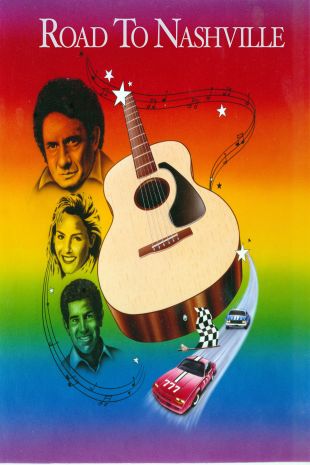Hardcore country & western fans will find Road to Nashville an essential document, as long as they aren't interested in a plot of any kind. The simple structure consists of hillbilly comic Doodles Weaver visiting Nashville and meeting one star after another, cracking wise for a few seconds before each performs a song or two. Weaver is painfully unfunny, spewing out embarrassing spoonerisms, mugging unbearably, and even wrecking "Home on the Range." If one can wince through his segments long enough, the reward is great footage of 20 mid-'60s Nashville country & western stars plying their trade, most of whom are inactive (or dead) today and had their hit records long before MTV ensured that every musician would be seen as well as heard. Watching Lefty Frizzell, Kitty Wells, and Webb Pierce performing signature songs is a rare treat indeed. Particularly exciting is a sublime reading of "Were You There When They Crucified My Lord" performed by a skinny, haunted-looking Johnny Cash backed by a latter-day version of the Carter Family. A pre-outlaw Waylon Jennings with slicked-back hair and smart black suit plays "Anita" while standing on a hay-strewn set which, considering the radical direction he later took with his music and image, he must have absolutely despised. Hank Snow offers his big hit "I've Been Everywhere" backed by the Rainbow Ranch Boys (featuring legendary fiddler Chubby Wise). As associate producer, it's not surprising that Marty Robbins grabs the lion's share of screen time, but he makes the most of it with some of his biggest hits ("Devil Woman," "El Paso"). For the most part, the acts keep their performances fairly sedate (most of the solo stars appear alone and lip-sync their contributions), but the Stoneman Family are vivacious and alive in their three numbers, particularly a blazing bluegrass instrumental with wild electric mandolin riffs that sounds truly spontaneous. There's some plain material along with the classic stuff, undistinguished ballads from forgotten aspirants (and big names like Dottie West and Connie Smith) that might remind the viewer of some of today's fluffier, uninspired country stars. Still, the dead spots are sparse and Road to Nashville is the kind of film that fans will be able to enjoy again and again.

Road to Nashville (1966)
Directed by Will Zens / Robert Patrick
Genres - Musical |
Sub-Genres - Musical Comedy, Showbiz Comedy |
Release Date - Sep 20, 1966 (USA - Unknown) |
Run Time - 110 min. |
Countries - United States |
MPAA Rating - NR
Share on